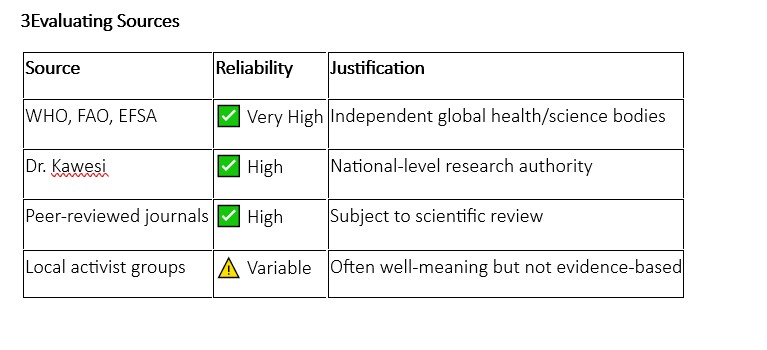Not True:
GMO Foods Do Not Cause Cancer or Infertility — A Deep Dive into Uganda’s Most Persistent Food Myth
Written by: Antonio Kisembo and Ali Kakembo
Written by: Antonio Kisembo and Ali Kakembo
In Uganda, a widely held belief persists – “Genetically Modified Organisms (GMOs) cause cancer and infertility.”
This claim is often shared in the media https://shorturl.at/66gVn , officials https://shorturl.at/KfBqI , and during community gatherings particularly as Uganda debates the implementation of the Biotechnology and Biosafety Law. Activist groups and some political figures amplify the narrative, warning that adopting GMOs would “poison” the nation and harm reproductive health.
Such a claim warrants verification, especially because it can influence national food policy, public trust in science, and food security in Uganda.
To investigate this claim, we sourced information from:

Does GMO food cause cancer?
No.
The World Health Organization confirms that:
“GM foods currently available on the international market have passed safety assessments and are not likely to present risks for human health.”
A 2013 meta-analysis of over 1,700 studies (Nicolia et al.) found no causal link between genetically modified food and cancer development. Additionally, national science academies from the U.S., UK, and Germany affirm that GMO crops are no more dangerous than conventional ones. Dr. Henry Kawesi, , states “There is no cancer risk associated with GMOs. These claims are emotional, not scientific. We have consumed foods developed using similar techniques, like insulin for diabetics, for decades.”
Do GMOs cause infertility?
No.
There is no credible evidence linking GMO consumption to infertility in men or women.
In fact, extensive animal feeding trials and human observational data have found no reproductive harm from GM foods.
Dr. Kawesi elaborates “The infertility claim has zero basis in scientific research. Unfortunately, it’s repeated by people who’ve never published or reviewed any food safety studies.”
What about studies that say otherwise?
Anti-GMO activists often cite a controversial 2012 study by French researcher Gilles-Éric Séralini, which claimed rats fed GM maize developed tumors and fertility issues. However:
Final Verdict:
The claim that GMOs cause cancer or infertility is FALSE.
There is a broad scientific consensus that GMOs are safe to eat. Misinformation persists largely due to fear, mistrust in science, and disinformation campaigns.
Why This Myth Persists in Uganda
This misinformation is not just misleading it’s harmful. It delays life-saving innovations, blocks food system progress, and stokes fear instead of informed dialogue.
This fact-check does not aim to silence public concerns. In a nation like Uganda where food is deeply cultural and history has taught people to be skeptical caution is understandable. However, we cannot allow fear to override evidence.
As Dr. Kawesi wisely puts it:
“The future of food security in Uganda lies in innovation, not fear. We must educate our people and let science guide our decisions.”
Recommendations
© 2022 - Media Challenge Initiative | All Rights Reserved .
© 2022 - Media Challenge Initiative | All Rights Reserved .